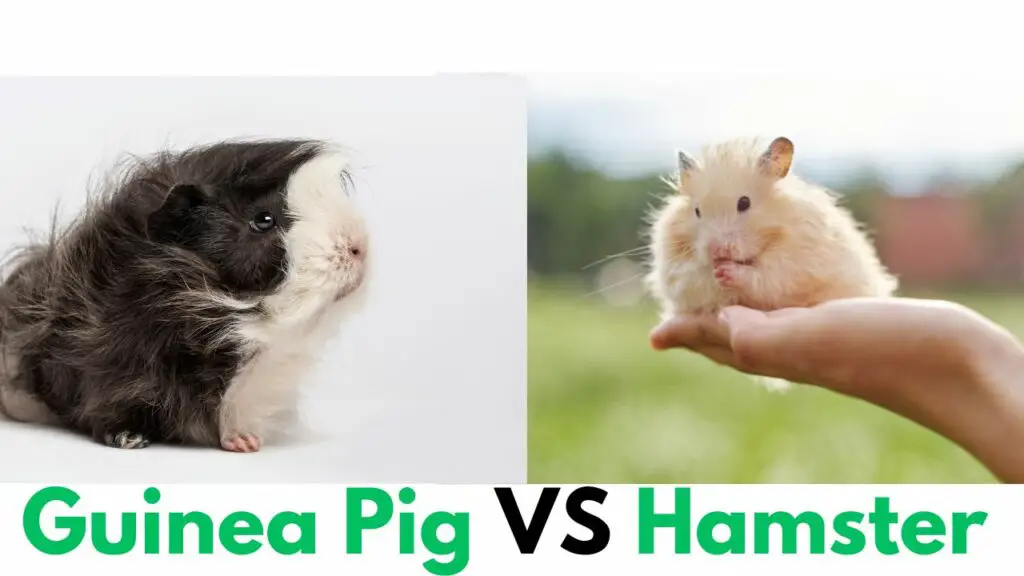Are you considering adding a small furry friend to your household, but can’t decide between a hamster or guinea pig?
Both animals are popular choices for pets due to their small size and adorable appearance. However, there are several differences between the two that you should consider before making a decision.
In this blog post, we’ll compare hamsters and guinea pigs based on their physical characteristics, behavior and temperament, grooming and healthcare, costs and maintenance, and help you determine which makes a better pet for you.

Physical Characteristics and Housing Requirements
Size and Weight
One of the biggest physical differences between hamsters and guinea pigs is their size. Hamsters are smaller and more compact, weighing in at around 100-150 grams and measuring 4-6 inches in length. Guinea pigs, on the other hand, are larger and heavier, weighing in at around 700-1200 grams and measuring 8-10 inches in length.
Cage Size and Type
Due to their smaller size, hamsters require smaller cages than guinea pigs. A good rule of thumb for a hamster cage is at least 450 square inches of floor space. Guinea pigs require more space, with a minimum cage size of 7.5 square feet for one pig and an additional 1.5 square feet for each additional pig.
It’s also important to consider the type of cage for each animal. Hamsters are burrowers and require bedding that they can dig into, such as aspen shavings or paper-based bedding. They also need a solid floor to prevent injury.
Guinea pigs, on the other hand, need a cage with a solid bottom to prevent foot injuries and require a soft bedding, such as hay or paper-based bedding.
Diet and Water Requirements
Hamsters are omnivores that require a diet of pellets, fresh vegetables, and a small amount of fruit. They can also eat the occasional piece of meat or egg. Guinea pigs are herbivores and require a diet of hay, pellets, fresh vegetables, and a small amount of fruit. Both animals also require fresh water at all times.
Behavior and Temperament
Activity Level
Hamsters are more active at night and sleep during the day due to their crepuscular nature. They enjoy burrowing and exploring their environment.
Guinea pigs are mostly diurnal so they’re more active during the day and enjoy interacting with their owners and other guinea pigs. They also enjoy exploring their environment and playing with toys.
Socialization and Bonding
Hamsters are generally solitary animals and prefer to live alone. They can become aggressive towards other hamsters if housed together.
Guinea pigs, on the other hand, are social animals and require companionship. They should be housed with at least one other guinea pig of the same sex to prevent loneliness and depression.
Both animals can be socialized and bond with their owners, but it takes time and patience. Guinea pigs are generally easier to bond with and enjoy interacting with their owners more due to their more social nature.
Nocturnal vs Diurnal Habits
As mentioned earlier, hamsters are nocturnal and guinea pigs are diurnal. This is an important factor to consider when deciding which animal is right for you. If you work during the day and are only home at night, a hamster may be a better choice. If you are home during the day and enjoy interacting with your pet, a guinea pig may be a better choice.
Grooming and Healthcare
Fur Coat and Skin Care
Most hamsters have short hair and require minimal grooming. Guinea pigs, on the other hand, have longer hair and require daily grooming to prevent matting and hairballs. Both animals also require regular nail trimming to prevent overgrowth.
Common Health Problems to Watch Out For
Both hamsters and guinea pigs are prone to certain health problems, such as dental problems, respiratory infections, and digestive problems. It’s important to monitor your pet’s health and seek veterinary care if necessary.
Veterinary Care and Costs
Both animals require regular veterinary care, including annual check-ups and vaccinations. The cost of veterinary care can vary depending on your location and the services required.
Costs and Maintenance
Initial Purchase and Setup Costs
Hamsters are generally less expensive to purchase than guinea pigs, but the cost of the cage and supplies is similar for both animals. The initial cost for a hamster can be around $20-$30, while the initial cost for a guinea pig can be around $30-$50.
Maintenance Costs: Food, Supplies, and Vet Care
Both animals require regular purchases of food, bedding, toys, and other supplies. The cost of these items can vary depending on your location and the quality of the products. Veterinary care can also be a significant expense.
Lifespan and Long-Term Care
Hamsters have a much shorter lifespan than guinea pigs, living on average 2-3 years compared to 5-7 years for guinea pigs. Both animals require long-term care, including regular cleaning and maintenance of their cage and regular veterinary check-ups.
Conclusion
Finding Your Perfect Pet
In conclusion, both hamsters and guinea pigs make great pets, but it’s important to consider their physical characteristics, behavior and temperament, grooming and healthcare, costs and maintenance, and long-term care before making a decision.
If you’re looking for a smaller, more independent pet that is active at night, a hamster may be the right choice for you. If you’re looking for a larger, more social pet that is active during the day and requires more interaction, a guinea pig may be the right choice for you. Whatever choice you make, remember to provide your pet with a loving and caring home for years to come.
- How Long Do American Eskimo Dogs Live? Important Factors and Care Tips - September 29, 2023
- Do American Bulldogs Need Grooming? Essential Tips and Care Guidelines - September 29, 2023
- Do Bengal Cats Enjoy Playing? Essential Tips for Keeping Them Active - September 29, 2023